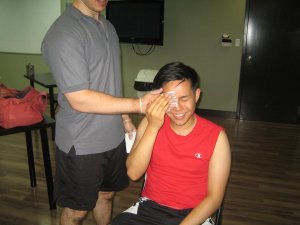
Recurrent corneal erosion is characterized by the recurrent breakdown of the outermost layer of the cornea called epithelium. In this condition of the eye, the epithelium is unable to tightly glue to its underlying membrane and making it susceptible to break off easily and without much effort or force.
The 3 major causes of recurrent corneal erosion are:
- Past corneal injury also known as corneal abrasion.
- Abnormal structure change of the cornea also known as cornea dystrophy.
- Underlying corneal disease.
Who’s At Risk?
It is very likely for people who have had a corneal injury with a sharp, clean and linear object to suffer from recurrent corneal erosion. Since, the cut is sharp and without any ragged edges, it doesn’t stick down tightly to the basement membrane. Also people who have an abnormal structure to the corneal epithelium, a condition called map-dot-fingerprint dystrophy, runs a huge risk of poor healing of a corneal abrasion. Thus, he is very likely to develop recurrent corneal erosion.
Signs and Symptoms:
It is quite impossible to see recurrent corneal erosion with naked eye. In this case the time course is very important. The patient might have had a corneal abrasion quite recently and will experience sudden burst of pain first thing when opening eye in the morning. Symptoms experienced in corneal abrasion are also prominent:
- Watering or tearing in the eyes.
- High sensitivity to bright light.
- Temporary loss of vision or blurry vision
- Redness of the eye
- Spasm of the muscles surrounding the eye which results in squinting
- Feeling of constant irritation due to the presence of something is in the eye
- Persistent pain which can be moderate or severe.
Self-Care Guidelines
It is very important to open your eyes gently when waking up. A sudden friction of lid may be enough to cause a tear in the corneal epithelium. The self-care guidelines to take care of recurrent corneal erosion are as follows:
- Keep the eye shut
- Never rub the affected eye.
- Don’t use contact lenses.
- Use artificial tears to bathe the eye.
- Use clean water to gently rinse the eye.
- Use sunglasses to reduce the sensitivity to light.
Recurrent corneal erosion heals on its own eventually, in absence of any other underlying corneal disease. But, it may take years for this to happen. If you feel the signs of this condition worsening, like if you suffer progressive vision loss or this is pus like discharge from the eyes, seek medical attention. Your doctor would prescribe you antibiotic ointments and drops and will teach you ways of handling your eyes gently. In severe cases, laser treatment can be recommended.